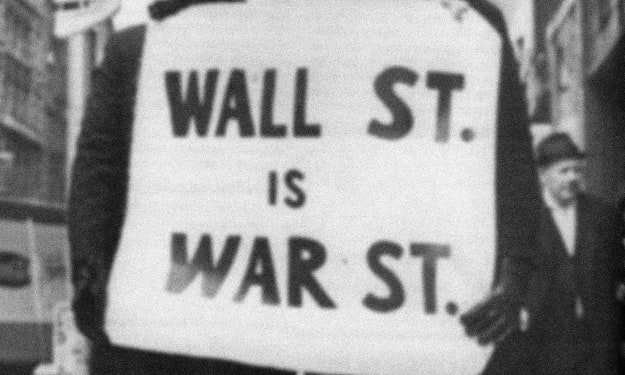Interview with Financial Reform Advocate Wes Christian
This transcript is an excerpt from an interview I did with r/Superstonk Live. In the interview, which took place in May 2021, Dave Lauer hosted and Redditor u/jsmar18 moderated a discussion with questions influenced by and taken directly from the AMA post on r/Superstonk.
This article was originally published on CEOBLOC by Wes Christian.
WC: So 20 years ago, a very infamous lawyer, John O'Quinn and I were meeting with a client, someone he actually went to church with who he and his friends owned, like 80% of the stock of the company. They could not understand how that many shares were trading every day, which exceeded the issue in outstanding shares of the company. It was a small cap company. Frankly, at that point I knew nothing about how this works, but I did know fraud. When I see it, as did Mr. O'Quinn, who I think got an $18 Billion settlement against the state of Texas against the tobacco companies. Likewise, our firm does many things and has gotten verdicts and stuff against others for other things too. But this is a passion of mine because I believe and I'll start out telling you this and I'll end up telling you this, that this could truly create US economies and world economies if it's not ultimately addressed at some level.
So from there, we started trying to understand how the clearing and process work, how shorting work, etc. And what we figured out pretty quickly is a lot of shares were being sold basically without delivering those shares. And what we learned is that in the clearing and the clearing process that a lot of the departments that are responsible for buying shares in, if they're not delivered, just wasn't happening. So we began to investigate that. We then teamed up with Patrick Byrne of Overstock.com. We then filed that case and we figured out in the process of that case that ultimately the mission of the bad guys was to rig the market. So how do they rig markets? They do it in about five different ways. They rig it with misinformation, in this case from Gradient Analytics and Camelback Research, who are actually being paid by a hedge fund to give Overstock an F. Ultimately, that case settled and we then went on to sue the prime brokers. From there we learned that massive failures to deliver existed in many of those firms. We learned that the class actions that were filed against the firm over stock were really done in bad faith. We also surprisingly got an SEC investigation ultimately to help push the stock down and then ultimately saw the option market go crazy in connection with options.
So we learned there, including from emails and other things I can't talk about because the information in that case is legally protected as they are. And in many of these cases, I learned that the perfect storm is to have them sell shares that they don't deliver. Get analysts to print bad stuff about you or people on the boards to say bad things about you. Go after your auditors, get an SEK investigation started, team up with class action lawyers to sue you for something. And ultimately the mission is to do everything they can to drive the stock down. Why? Because every undelivered share is a share that is a contingent liability on their books. So basically, from there, I'm being asked to scoot closer to the camera from there. From there, basically what it tells you is that their mission is to rig the game. The next big case we went to was the Taser gun company. And from there, we ultimately learned other things. Stock was being lent that doesn't exist, which is another systemic issue. Because in order to hold a second look at the camera, put the window on the screen closer to the camera. From there, basically, we learned that the bad guys were going to the market. Some group of people were buying puts. Another group of people were buying calls and they put together synthetic shares. Synthetic shares means that I'm going to artificially create a share. Why? Because once that contract consummates, you know, one's got the put one's got the call.
WC: Unfortunately, in many cases, what happens is that the contract is torn up two days before consummation. So while they're able to show it to the compliance department, ultimately the end result is, is the transaction a fake transaction? Again, more misinformation in the marketplace. We also learned during that period of time in several cases that the failures to deliver were hidden in subsidiary companies. So the failures may go to Canada, they may go to the UK, they may go other places. In addition, they would do reverse conversions, which is basically a fancy word whereby they would enter into another, let's call it futures contract. But it too wasn't wasn't consummated. So again, more misinformation. In addition, locates were being given on shares multiple times when there's only one share. So somebody would call, you know, Merrill or Goldman and say I need to locate those locations multiple times and they would be done so when only one shares two shares. Again, I'm making up the hypothetical. There are many locations that are being given where shares simply don't exist. So the lack of enforcement and oversight in the stock lending business is a key issue in this whole saga. And incidentally, just for the record, a lot of this, I'm telling you, is in these enforcement actions. So I'm not specifically talking about any discovery from the individual cases. I'm talking about things that came out and what you're going to read from the regulators. So in addition to lending their clients margin shares, which don't forget each one of you out there who signs a margin agreement, it gives them contractually the right to lend your shares.
WC: Another thing that you'll see in the enforcement actions which we've seen in cases is they're using cash account shares. Cash account shares in the states are protected by rule 15. See three, three. And in doing so, that rule says the cash account shares, that is shares that aren't leveraged in a margin account, have to be segregated in the United States that can't be touched. The broker can't do anything to encumber them. Well, guess what? Those shares are likewise being used. So what's the mission there is to keep your eyes on your cash account shares and make sure they don't leave. And if you can get a lock up agreement from your broker, because they are doing that, and as Dave knows, because Dave is, I think originally from Canada, as I recall, basically Canada changed the rules here about two years ago when I went up to speak on a symposium that the McMillan Firm in Canada had given, and I spoke out against cash account shares being used in Canada. They can now use your cash account shares to actually short against you for their own proprietary trading account. Oh, but it's with your consent. Many people probably don't read the fine print when they give that consent, but believe it or not, that's legal in Canada. Until they change that, if you can imagine anything that crazy.
DL: So do you think that in terms of those lock up agreements that you mentioned for cash account shares, is that the kind of thing that is a standard request that somebody can make of their broker?
WC: No, it isn't standard, but it can be done, I'm told. Again, that's not my area of expertise. But I do know because I have clients that own big blocks of shares that have that agreement. So I do know it can be done and it exists. And I can also tell you, I know hundreds and hundreds of instances where not with the lock up agreement but where it was put in a cash account, shares that the shares disappeared. They're gone because ultim
ately, don't forget, their mission is to try and use every conceivable share they can to cover up the crime because it is illegal to, at least for us, and frankly, it should be for everybody and it is illegal for everybody, but it's just not enforced. But for the individuals, it is enforced. We must borrow those shares before we can short. But that isn't how the big boys do the game. They get a borrow that isn't a real borrow or they don't borrow at all, especially if they're self clearing for those citadels like Citadel. So if you're listening, go, go check out the Qs. In case of the seven biggest prime brokers Merrill Lynch, Deutsche Bank, Credit Suisse, UBS, Goldman, ET cetera. And you're going to see that proprietary trading is one of their biggest moneymakers in stock lending is another big moneymaker. Now, can I prove that proprietary trading is doing this illegal activity? I cannot, but I can tell you it's an enormous moneymaker for them.
Wes has decades of experience handling a wide range of complex civil litigation matters. His primary focus in the last several years has been suing Wall Street for stock manipulation, oil and gas companies for royalty fraud, and banks for aiding and abetting Ponzi schemes. He has also handled many disputes involving breach of contract, fraud, intellectual property, breach of fiduciary duty, serious personal injuries or wrongful death actions, insurance defense, and real estate matters. Wes has handled complex litigation and arbitration cases in 8+ states and two countries. He served as the Chair of the Litigation Section of the State Bar of Texas from 2018-2019, overseeing a group of 8,700 litigation in Texas. Learn more at his website:
About the Creator
CEOBLOC
We are a bloc of public CEOs, executives, and shareholders committed to putting an end to naked short-selling and other abusive trading practices.






Comments
There are no comments for this story
Be the first to respond and start the conversation.